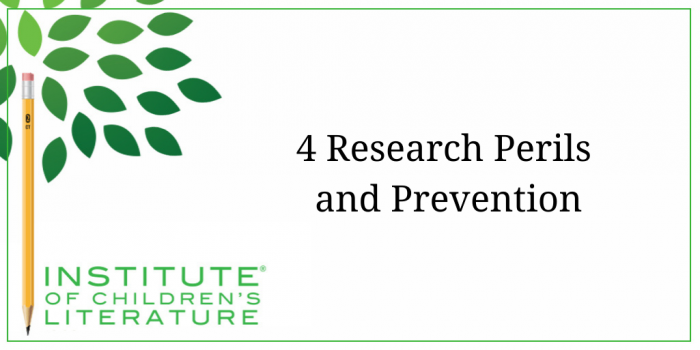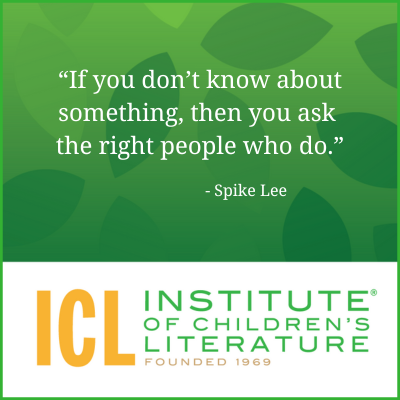1000 N. West Street #1200, Wilmington, DE 19801
© 2024 Direct Learning Systems, Inc. All rights reserved.

Since most of my online behavior jumps between a handful of sites (mostly writing sites), I rarely come into contact with viruses or malware of any sort. But that changes when I’m in the middle of a research project, especially when the research touches on pop culture or technology; but really, any research subject can push a writer onto a site that has been compromised by malware.

But all good security requires frequent scans and constant updating. The one thing I absolutely would not do is rely on whatever security programs came with your computer. Put those research skills to the task and find the best programs to work for you and your computer. You’ll be glad you did.
Although a good researcher becomes a temporary expert in a narrowly focused subject, it’s important to realize that the pool of interesting information is endless. If you allow yourself to make detours whenever you spot something interesting, you can quickly find you’ve put in so many hours of research that your final written book or article or short story could not possibly make enough money to pay for all that time.
Now, I sometimes enjoy research for research’s sake (when I have the time, which isn’t often). In a situation like that, I might spend a month simply exploring all the aspects of a topic. For instance, when I learned of Matthew Henson, an arctic explorer, I was fascinated by him and by the whole world of exploration in extreme conditions. The danger of that kind of exploration was eye-opening and the more I researched, the more questions I had. So the whole research experience was wonderful. It took a full month. I read books, talked to experts, and studied documents from the period. And in the end, I wrote a piece for Highlights, but that was all. It was a huge personal indulgence and not something I can do very often. I couldn’t make a living that way. So I absolutely must become a temporary expert in a much shorter period of time.
There are two ways to help keep your research from running away with you: planning and knowing when to stop.
One is a quick skim of the topic. I read the sources that are easy to find (and thus a bit questionable). These sources are probably regurgitating information from other sources, but during the skim, I don’t care. I’m just looking for the shiny thing in the midst of the stuff “everyone” knows. I skim until my inner curious kid forces me to stop because she’s clamoring to know more. That’s the point where I’ve usually found my focus, in the narrow section of a large topic. That will become my guide dog for research. I list the questions I have about this narrow focus and I dig deep.
Remember my research on Matthew Henson? Well, there were several interesting and little explored shiny things that popped up in the research. One involved a murder taking place in the arctic cold far from home. I was fascinated by that and could have easily dug deep just in that one spot, ultimately coming up with a great thriller topic, or even a lively historical mystery. Another thing that fascinated me was how little people understood about extreme exploration. Explorers received the most absurd suggestions for how to survive. Honestly, one suggestion was to build a soup pipeline to send hot soup to the men out in the vicious cold near the North Pole. The lack of understanding of the world, meant that explorers often came home and made considerable money travelling and speaking about where they went and what they saw. They would dress up and display their gear. So I found much of interest and could have gone for more in-depth focus within the larger topic of arctic exploration. Choosing these narrow, deep dive focus topics and sticking to them (as much as possible) helps tremendously in limiting the time spent researching.
All this research can lead you down the rabbit hole, so you need to know when to stop. Once you have chosen your narrow focus and have begun the research necessary to become an expert on that topic, how do you know when that is? Well, different researchers have different methods. One popular one is to stop when you begin finding the same information over and over and over. Another is to make periodic stops to outline an article or book from “what you know for sure so far.” Then use that outline to direct your continued research. Once you have everything you need to write the book or article that you’ve outlined, you stop and write it. Sometimes the writing will send you back for more research to fill in holes you didn’t spot before, but the outline method will help you stay on task and help limit how much time you spend.
Research isn’t simply the acquisition of information. It is also the evaluation of information. We live in an information rich world now. Well, we also live in a misinformation rich world. No matter what subject you have chosen, some of the information you will find about that subject will be suspect (or flatly wrong). The key to getting the best sources has to do with their distance from primary.

Of course, there is a human element even in these primary sources. Simply because you have a primary source document doesn’t mean the person writing the document didn’t lie or make mistakes. The letter home might have downplayed the danger. A journal might have put too much focus on the person writing it. So even primary sources require careful evaluation by the researcher and careful handling in the end result. If you built an article on letters from home, you might mention in the introduction that the letter writer might have been downplaying the danger to avoid scaring his family.
So a good writer evaluates the quality of the research (how close it to primary) and any potential bias in the source, even when it’s primary. When you do both, you will stand the best chance of writing something that will sell and something that will be valuable for the reader.
The last frequent research mistake is taking off your researcher hat when it comes time to sell the piece you’ve written. Sure, research is an important part of making your writing accurate, clear, and multi-layered, but it’s also an important part of selling your writing. The skills you put into research should also be carried into hunting down markets and agents. Or into updating your information on markets and agents. Now, everyone can make a mistake and send a manuscript to a magazine that has recently stopped publishing or a book publisher that has changed their focus. If you are submitting to magazines that closed, or agents who retired, or publishers who changed focus several years ago, that does make you look bad. If you submit fiction to a nonfiction magazine, or send a manuscript that you simply identify as “a children’s book,” then you could be rejected without a read. If you look like someone who cannot be trusted to get facts right because you didn’t do your research on the publisher, then your whole work becomes suspect.

So my initial “market guide” research involves going through the guide and highlighting all the markets that appeal to me because they publish things similar to what I enjoy writing (and/or write well). This much smaller collection of markets are the ones I’ll keep updated through regular research. I’ll check the publisher’s website, but I’ll also use a search engine to track down information about the publisher that was written by others. That will point me at reports by other writers (for instance, learning a market tends to require multiple invoices before they “get around” to paying you is information I need when deciding if that is a good market for me) as well as reviews of the products the publisher produces (after all, if the publisher has a poor reputation for quality, do I really want my work in there?) All of this on-going research will ultimately save me time because I won’t send material to publishers who have closed or who aren’t paying on a timely basis or have changed their focus to something different. Sure it costs me time to save time later, but the reason I consider that worthwhile is because I know when I have a piece in mind to sell, I’m excited and impatient. So if I wait until then to do my research, I’m going to do a rush job. That’s why having good information, constantly updated, makes the submission process smoother and much more prone to success.
So watch these research problems and pitfalls and you’ll find research becomes a tool you value above all others, because it’s the tool to make you money. And don’t we all like that?
With over 100 books in publication, Jan Fields writes both chapter books for children and mystery novels for adults. She’s also known for a variety of experiences teaching writing, from one session SCBWI events to lengthier Highlights Foundation workshops to these blog posts for the Institute of Children’s Literature. As a former ICL instructor, Jan enjoys equipping writers for success in whatever way she can.
1000 N. West Street #1200, Wilmington, DE 19801
© 2024 Direct Learning Systems, Inc. All rights reserved.
1000 N. West Street #1200, Wilmington, DE 19801
© 2024 Direct Learning Systems, Inc. All rights reserved.
1000 N. West Street #1200, Wilmington, DE 19801
© 2024 Direct Learning Systems, Inc. All rights reserved.
1000 N. West Street #1200, Wilmington, DE 19801
© 2024 Direct Learning Systems, Inc. All rights reserved.

1000 N. West Street #1200, Wilmington, DE 19801
© 2025 Direct Learning Systems, Inc. All rights reserved.

1000 N. West Street #1200, Wilmington, DE 19801
©2025 Direct Learning Systems, Inc. All rights reserved. Privacy Policy.
4 Comments